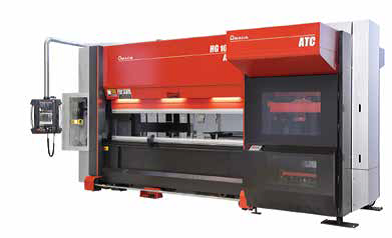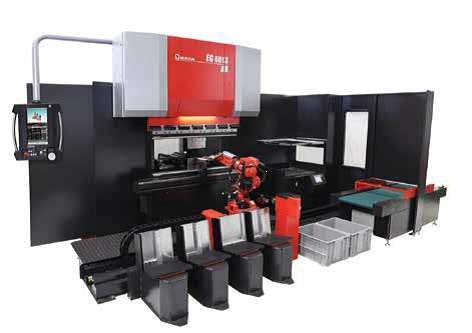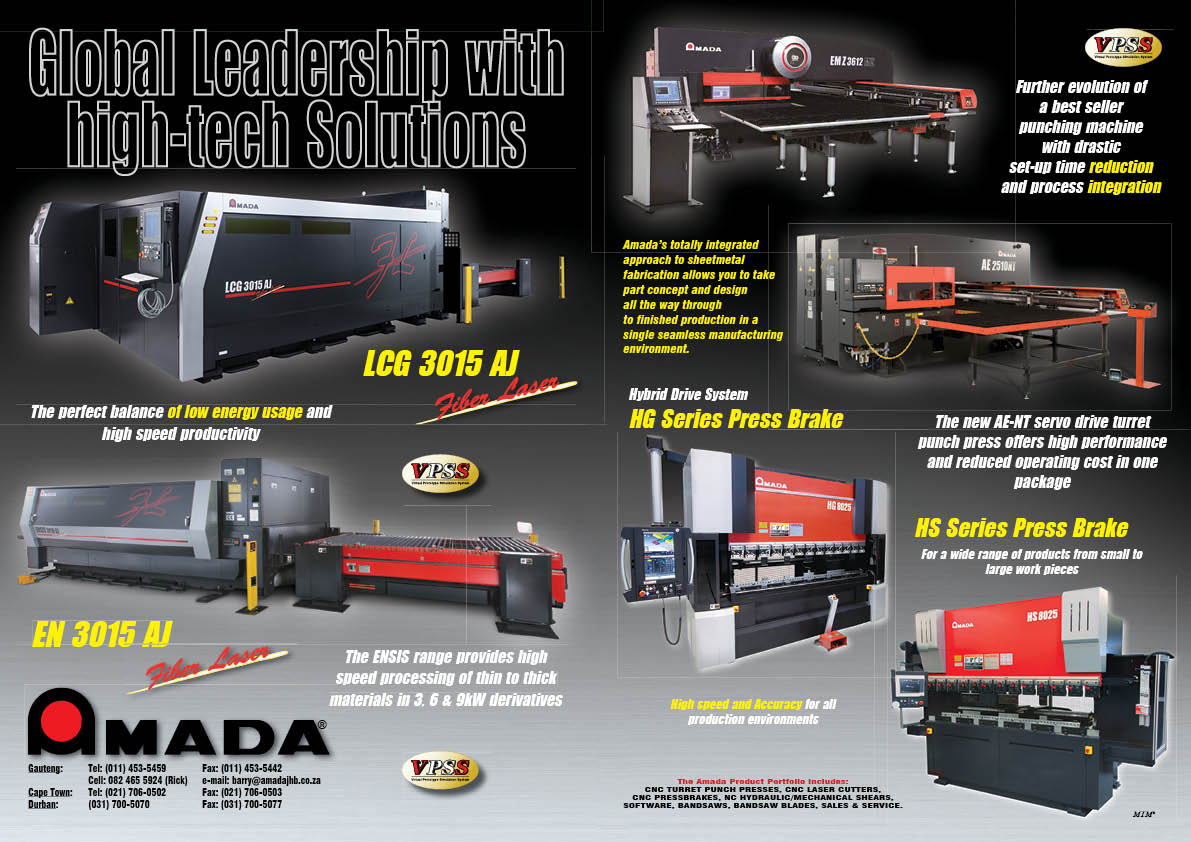AMADA – MORE AND MORE ECO – FRIENDLY
By Barry Page, Amada
Machinery is becoming more eco-friendly, thanks to the reduction or in some cases elimination of oils in their drive systems. Some of the latest technological advances allow more machinery and bigger machinery to be operated with less power consumption and a smaller carbon footprint, while ensuring higher throughput. These advantages are seen through the new A.C. servo drive systems used on punching, bending and stamping machines, as well as through the latest fiber technology on lasers.
Today’s technology in the fiber laser field is something that not many people saw coming. The efficiency of fiber systems is greatly attributed to the eradication of costly internal components such as tubes, internal optics, turbo blowers, vacuum pumps etc, as well as the elimination of laser gas being used to generate the laser beam. The latest generation 3 fiber laser systems is even more compact and efficient than the 1st and 2nd generation units.
Amada has incorporated features that subsequently contribute towards reducing costs, such as automatic nozzle changing, automatic nozzle cleaning and automatic nozzle recalibration. An added advantage is a scheduler function, which can be used, while full production planning and scheduling is executed in the planning office.
Automatic material handling systems can be supplied with machines or retro-fitted at a later stage. These systems are capable of storing materials, while automatically feeding them to the machine as required.
Amada offers automated material storage and manipulation systems for full blanking and bending operations. The “entry level” manipulation systems referred to as “MPL’s” consist of two material pallets and are capable of holding up to 2000kg raw material each. There is a third pallet for offloading of finished sheets with parts either held in by micro-joints or not.

The MPL uses an array of vacuum suction cups to lift and separate the sheets from sticking together, while loading the cutting or punching table. Checking of material thickness according to the part or nesting program is accomplished by the sheet thickness detector.
While the sheet is being processed, the MPL will then prepare and lift the next sheet and get ready for changeover. Priority is given to unloading the cut sheet and reloading a new sheet before the stacking of the processed sheet happens. This ensures speedy changeover and minimal machine idle time. The same principle applies to the Amada ASF series of sheet storage and manipulation systems.
These systems have various shelves for raw materials with each shelf holding up to 2 tons of different thickness and types of materials. The advantage of these systems is that longer, uninterrupted production runs are possible.
Both these systems, MPL & ASF, can be enhanced with the addition of a “TKL” automatic parts removal system which can be retro- fitted. The TKL also uses an array of different sized suction cups to pick desired components out of the skeleton and sorting them into desired piles depending on the next process required. This is especially advantageous when cutting nestings of different jobs. Parts are automatically sorted from the skeleton before the operator intervenes. Up to 3 different packing stations are available for part-sorting.
A higher level of automation can be achieved with the Amada MARS system, which is designed according to customers’ requirements. Accessible from either side, each shelf can hold up to 2 tons of different materials. Machinery is then connected to the MARS system via intermediate MPL systems. Material is fetched, checked for thickness and loaded automatically. Once sheets are processed, the full sheet can be removed or the TKL can be used before the skeleton is taken away for storage. Parts are then returned to the MARS system for storage until they are needed for the next process. By utilizing this latest technology, 24 hour production is possible without the need for staff to be present.
Semi-automatic or fully automatic bending available from Amada, offers the latest technology, namely the HG – ATC press brake series. Available in either a 100 ton x 3 meter or 220 ton x 4 meter configuration, these ATC machines are ideal for the reduction of tool change down-time, especially in today’s production environment of small batch runs, requiring quick change over times.
All programming, sequencing and tool fitting is done in the production office before reaching the shop floor. The programs are sent via network to the machine, where the operator can see a full 3D view of the component, both blank and bent. The machine automatically loads the required tooling into position from the onboard tooling magazine. Once the bending process is completed, the machine will automatically change tooling again. A full 3 meter tool change can now be done in just over 3 minutes, while a similar manual tool change would take 15 to 45 minutes.
Tool life is substantially extended and incorrect tool usage and tool damage are eliminated. Programming software identifies tool capabilities such as maximum permitted tonnages etc. thanks to each tools’ unique identification code.
For longer production runs together with total operator elimination, Amada offers the “AR series” of robotic benders. These benders incorporate robotics which pick the parts, bend the parts and stack or place as required. These, too, are available for different tonnages.

For more information, please contact Amada – Tel: 011 453-5442.





